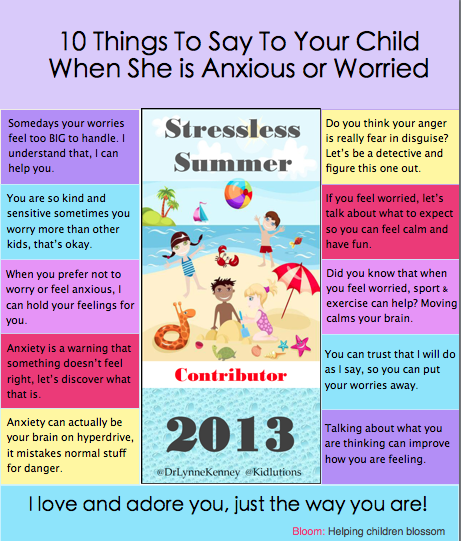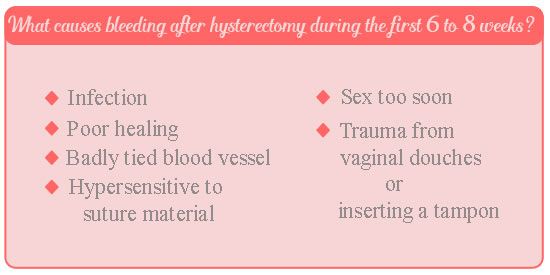How to help a child with stress
Stressed out kids? Signs and strategies
Speaking of Health
Topics in this Post
- Pediatric Medicine
- Children's Health (Pediatrics)
- Behavioral Health
- Stress Management
- Balance your mental and emotional health
Life is full of unpredictable changes. Some can be exciting and motivating, while others can lead to increased stress, poor health and anxious feelings.
Stress is an automatic physical, mental and emotional response to challenging events. It's a normal part of everyone's life, including the lives of children.
Children have faced many new and potentially stressful situations during the COVID-19 pandemic. For some, there have been changes in school and activity routines, family changes with moves or a parent's career disruption, and concerns over their health or the loss of a loved one.
Children, especially teenagers, aren't likely to ask their parents to help them manage their stress. Sometimes, they don't even recognize that they are feeling stressed out.
As a caregiver, you might notice something is off before they do. Helping your children manage their stress can lead to more balanced and healthier lives.
Signs of stress in children
Children aren't miniature adults, and they may express stress in different ways than you might expect.
Here are a few signs that your children may be stressed out or could use some extra support:
- Emotional outbursts or increased irritability
Stress leads to stronger feelings of anger and irritability. Your children may have emotional outbursts that are inconsistent with their previous behavior or the current situation. - Trouble sleeping
Worries and fears seem to come out during bedtime. Children who are stressed may have trouble falling or staying asleep, or start having nightmares.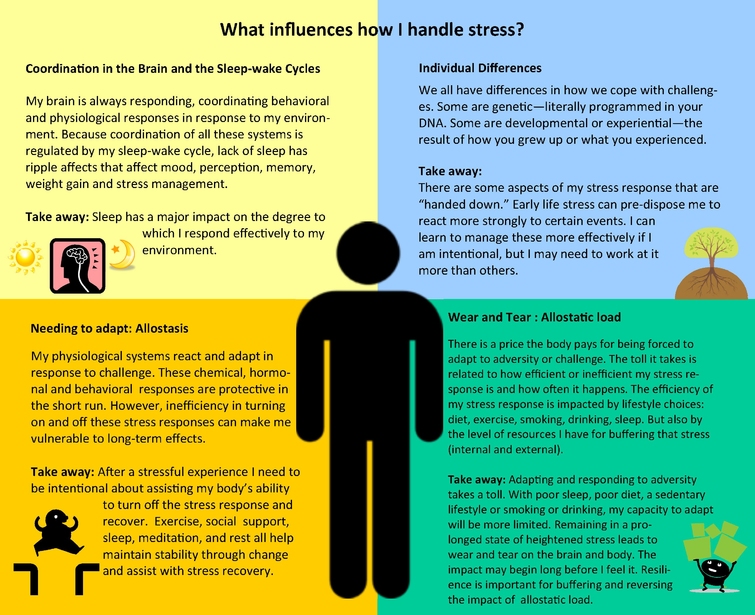
- Withdrawing from others
Children who are stressed may want to spend more time alone and not interact with friends or family. - Struggles with school
Significant changes in your children's school performance can be a sign of stress. Stress makes it harder for children to focus during the school day or when doing homework. Emotional outbursts and anger at school can cause trouble with friends and classmates. - Frequent headaches or stomachaches
When children are stressed or anxious, their bodies release the hormone cortisol into the blood. This can trigger abdominal cramps and headaches. - Increased defiance
Children under stress may feel angry or overwhelmed. They are seeking ways to get out of the situation that is causing them to feel uncomfortable. This can lead to defiant and stubborn behaviors.
Remember that children's signs of stress can vary based on age, personality and coping skills. The key is to watch for drastic or sudden changes from your children's previous behaviors.
The key is to watch for drastic or sudden changes from your children's previous behaviors.
Managing defiance
Usually, children don't have a lot of power or control in their lives. They are told when to eat, when to sleep, how to act, what is appropriate to wear, what is appropriate to say and what they should learn. The list goes on.. Children know how to get a reaction out of and manipulate their parents. And sometimes saying no is the only control they feel they have that day.
Sometimes there is a purpose for their misbehavior, such as to gain attention or get something they want. Other times, they might just be on autopilot because they are exhausted and their brains simply aren't able to regulate their emotions or actions anymore. They are exposed to different experiences throughout the day that parents might not even know about.
Their brains are not developed until they are about 25 years old, and they might just not know how to process the day's experiences.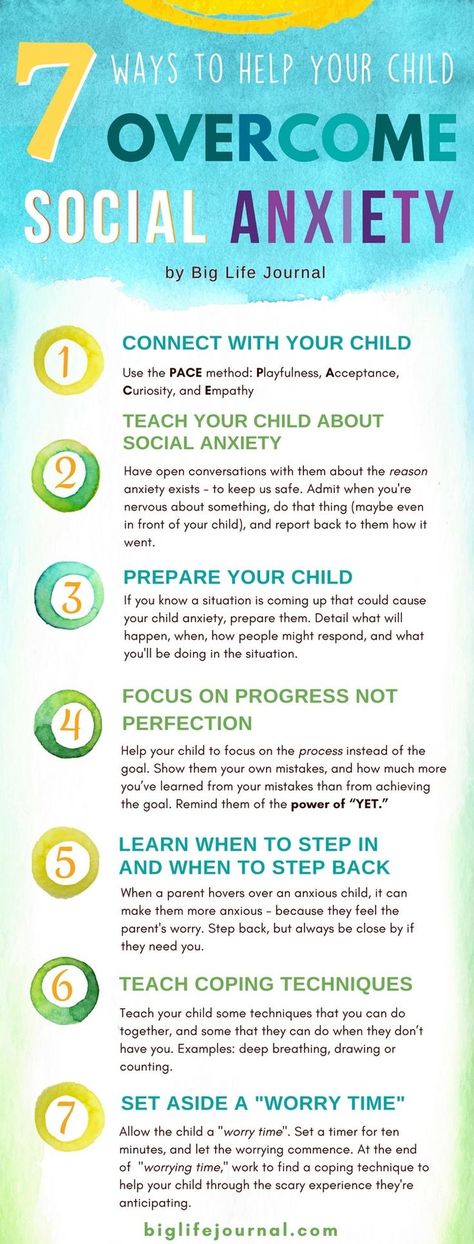 Because of this, children's ability to respond relationally differs from adults, and they tend to respond emotionally and impulsively.
Because of this, children's ability to respond relationally differs from adults, and they tend to respond emotionally and impulsively.
As a parent or caregiver, it can feel exhausting when your children act defiantly.
Here are a few tips for managing children's defiant behaviors:
- Set expectations.
Children thrive on routines and set expectations. Outline examples of behaviors you will and will not tolerate. When correcting children, tell them what you want them to do rather than what not to do. For example, instead of saying, "Stop chewing with your mouth open," try saying, "Please chew with your mouth closed." - Act, don't react.
When children act defiant, the instinct to react is human. The expression of emotion also is human. Take a deep breath and calmly correct behavior. Don't mirror their anger level. Maintain calm and set clear expectations. Maintain consistency. For example, don't say yes to something just because you want the behavior to end. Rather, validate their emotion and follow through with your set expectation. Remind yourself that your children are impressionable, and your words matter. They need to know it's OK to express their emotions respectfully.
Rather, validate their emotion and follow through with your set expectation. Remind yourself that your children are impressionable, and your words matter. They need to know it's OK to express their emotions respectfully. - Pick your battles.
If their behavior is simply irritating but not dangerous or illegal, try to ignore it. The moment they do something positive, complement them. Sometimes children simply want a reaction, so try to react to the positive behaviors instead of the negative. - Focus on two or three behaviors only.
Children may feel overwhelmed or inadequate if you try to correct every concerning behavior. A focused approach will get better and quicker results in improved behaviors.
Coping with stress
While all stress cannot be eliminated, you can prevent excess stress from affecting your children's lives by:
- Establishing and keeping routines
With many simultaneous changes, children need to be able to count on something that's going to be the same most of the time. That's why routines are so important. If your family wasn't routine-orientated before, now is a good time to implement daily routines to provide structure and support. You could start a new bedtime habit or strive to have supper together a few nights a week to provide consistency at home for your children.
That's why routines are so important. If your family wasn't routine-orientated before, now is a good time to implement daily routines to provide structure and support. You could start a new bedtime habit or strive to have supper together a few nights a week to provide consistency at home for your children. - Finding times to talk
Children tend to have a difficult time starting a difficult or uncomfortable conversation. Find times to talk to your children when you are doing something together. This could include when you are making meals. Invite them to join you in the kitchen. Find time to sit at the table to eat together. If you are driving somewhere, that is also a good time. Children tend to share more when they do not have to look straight at you or feel pressured to talk about their feelings or experiences. - Encouraging a return to previous activities
During the pandemic, many children's activities were delayed or canceled. After going a long time with little social contact, some kids have anxiety about returning to activities they previously enjoyed. Depending on your local health recommendations, encourage your children to try a new or previous favorite activity or sport again. If your children resist, set a timeline to reevaluate their feelings. For example, ask your children to try the activity for two weeks before making any final decision. It's good for them, and most will find they enjoy it once they get going again.
After going a long time with little social contact, some kids have anxiety about returning to activities they previously enjoyed. Depending on your local health recommendations, encourage your children to try a new or previous favorite activity or sport again. If your children resist, set a timeline to reevaluate their feelings. For example, ask your children to try the activity for two weeks before making any final decision. It's good for them, and most will find they enjoy it once they get going again. - Allowing choices
Children have few choices. Allow them to have some choices when appropriate. This might include what to eat for supper, what to watch on TV, what game to play and so on. - Finding humor in daily life
A good laugh doesn't just lighten a mood, it also activates and relieves the body's stress response. Find ways to laugh with your kids by watching comedies, reading comics or jokes, playing games, and helping each other find the humor in daily life.
- Playing as a family
Get physically active with your kids and find ways to play as a family. Put on music and dance in the kitchen, go for a bike ride after dinner, or play games as a family. These activities can reduce how stress affects you and your children. - Encouraging healthy diet and sleep habits
Tired or hungry kids are rarely happy. Make sure that your children's diet includes a mix of fruits and vegetables, whole grains and lean proteins to keep them full and focused. A lack of sleep can trigger overreaction or emotional outbursts, so follow a bedtime routine to make sure your children get enough sleep each night. Encourage good sleeping habits of shutting of the TV, turning off the phones and putting away electronics. Allow time to transition from the activity of the day to becoming ready for bed. The body naturally creates melatonin, but the body needs to know that it is nighttime. Try dimming the lights and having them do something that does not stimulate their mind.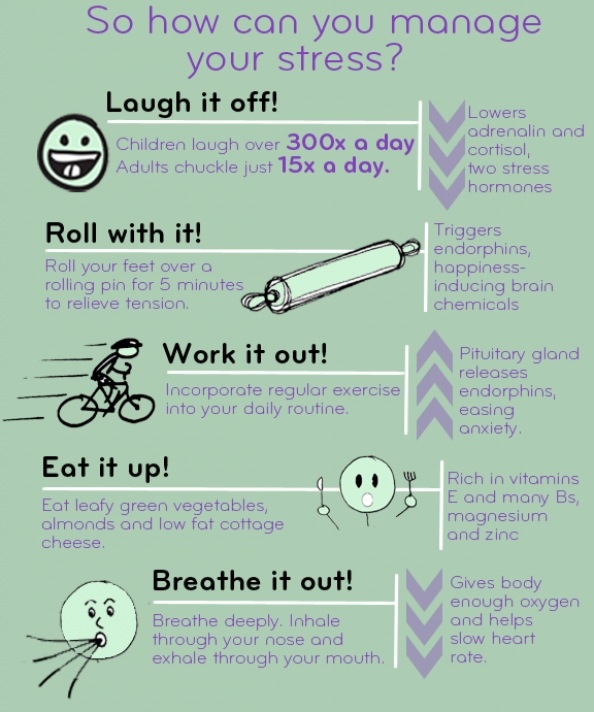 This could include reading a book, writing in a journal or doing something that does not have a light on it.
This could include reading a book, writing in a journal or doing something that does not have a light on it. - Practicing deep breathing together
Deep breathing is a great way to reduce stress levels. Help your children practice by taking deep breaths in for a count of five seconds, hold for two seconds and release to a count of five seconds. If your children feel anxious, try this simple exercise to unstick the mind from the worry setting. - Enlisting help of children's teachers
With kids back in classrooms, take the opportunity to check in with their teachers. Ask how your children are doing, if they are making friends, or if the teacher is noticing any problems between your children and other students. Often, children won't tell their parents about issues they have at school, as they may feel embarrassed. Sometimes parents are surprised to learn their children are being bullied at school. Teachers and school staff can be your eyes and ears when your children are not with you.
- Managing your mental health
It's hard to be an effective parent if you struggle with your mental health. Take steps to keep burnout and stress at bay in your life.
Tonia LaCore is a licensed social worker in Psychiatry & Psychology in Fairmont, Minnesota.
For the safety of our patients, staff and visitors, Mayo Clinic has strict masking policies in place. Anyone shown without a mask was either recorded prior to COVID-19 or recorded in a non-patient care area where social distancing and other safety protocols were followed.
Topics in this Post
- Pediatric Medicine
- Children's Health (Pediatrics)
- Behavioral Health
- Stress Management
- Balance your mental and emotional health
Related Posts
5 things you need to know about mental health and girls
Blow the pain away: Breathing tips to help children relax
Breaking the adverse childhood experiences cycle
Helping Children Handle Stress - HealthyChildren.
 org
orgAs children reach their school-age years, they may experience pressure from a number of sources. These may be from within children themselves, as well as from parents, teachers, peers and the larger society.
This pressure can take many forms, to which children must respond and adapt. Whether these are events are lasting, like the divorce of their parents, or merely a minor hassle like losing their homework, these demands or stresses are a part of children's daily lives.
There is a silver lining is that when children get the chance to practice setbacks at younger ages. They develop
resilience and the tools needed to be an independent adult and handle future challenges.
Dealing with stress in daily life
Children welcome some events and are able to adapt to them with relative ease. Other events may feel to them like threats to their own or the family's daily routines or general sense of well-being. These stresses can be more troublesome.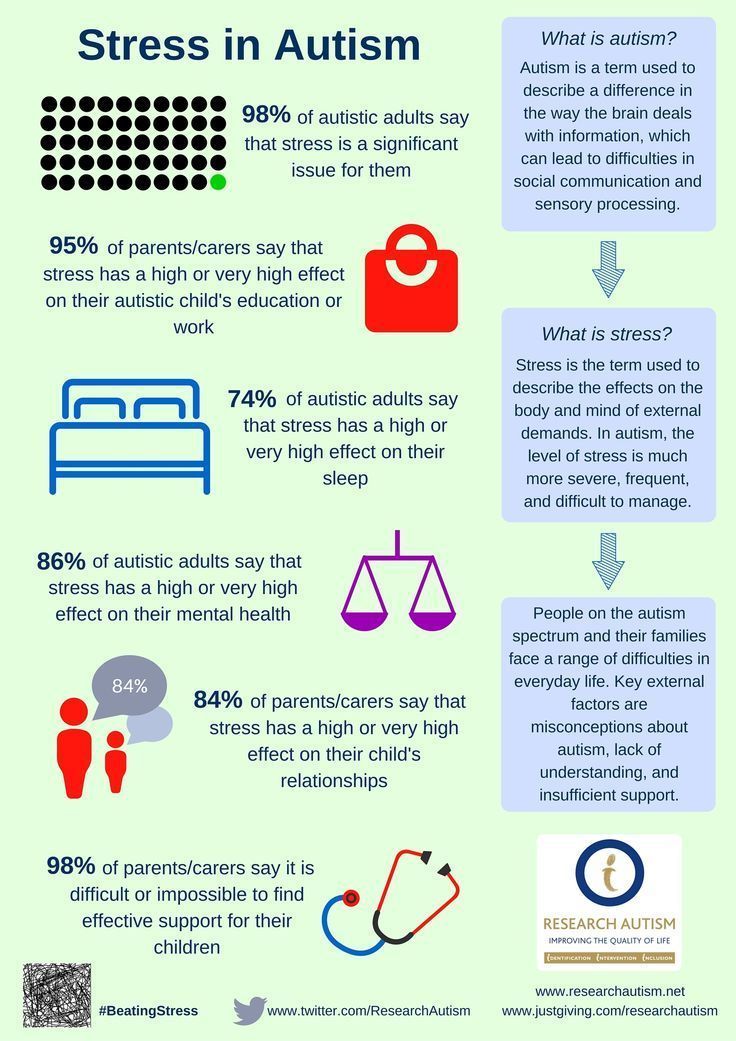 Most stress faced by children is somewhere in the middle: neither welcomed nor seriously harmful, but rather a part of accomplishing the tasks of childhood and learning about themselves.
Most stress faced by children is somewhere in the middle: neither welcomed nor seriously harmful, but rather a part of accomplishing the tasks of childhood and learning about themselves.
Children may have to cope with a bully on the playground, a move to a new neighborhood, a parent's serious illness or the disappointment of a poor sports performance. They might feel a constant, nagging pressure to dress the "right" way, or to achieve the high grades that can put them on rack toward the "right" college. Children may also worry about making friends, dealing with peer pressure, or overcoming a physical injury or disability.
Children are sensitive not only to the changes around them, but also to the feelings and reactions of their parents. This is true even if those feelings are not communicated directly in words. If a parent loses a job, children will have to adjust to their family's financial crisis; they must deal not only with the obvious family budgetary changes but also with the changes in their parents' emotional states.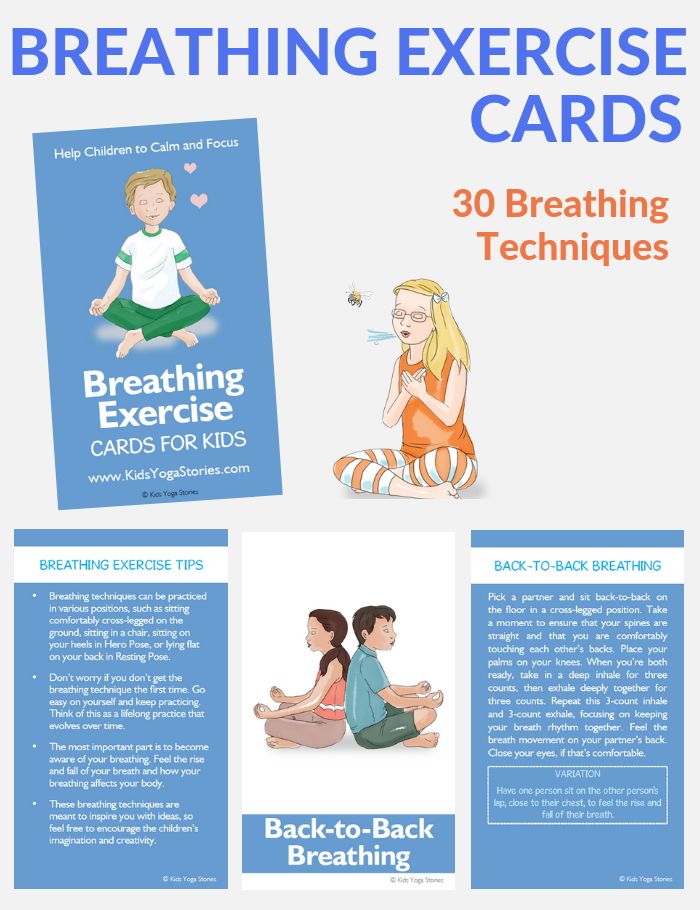
Good and bad stress
Not all stress is a bad thing. Moderate amounts of pressure from a teacher or a coach, for example, can motivate a child to keep her grades up in school or to participate more fully in athletic activities. Successfully managing stressful situations or events enhances a child's ability to cope in the future.
Children are future adults, and through these experiences, they develop resilience and learn how to deal with life's inevitable bumps and hurdles. However, when the stress is continuous or particularly intense, it can take a toll on both the psyche and the body.
Major events, especially those that forever change a child's family, such as the death of a parent, can have lasting effects on children's psychological health and well-being. Minor daily stresses can also have consequences.
Sudden stressful events will accelerate your child's breathing and heartbeat, constrict blood vessels, increase blood pressure and muscle tension, and perhaps cause stomach upset and headaches.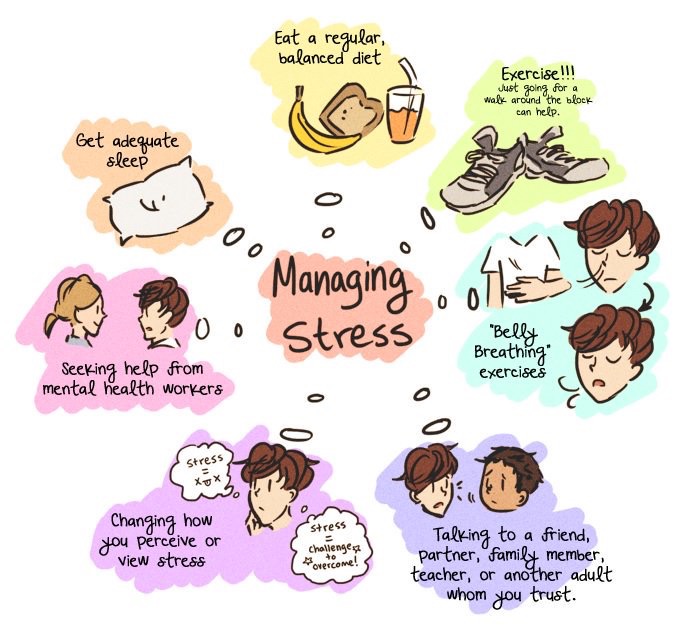 As stress persists, it can make a child more susceptible to illness and experience fatigue, loss of sleep, nightmares, teeth-grinding, poor appetite, tantrums, or depression. Children may become irritable or their school grades may suffer. Their behavior and their willingness to cooperate may change.
As stress persists, it can make a child more susceptible to illness and experience fatigue, loss of sleep, nightmares, teeth-grinding, poor appetite, tantrums, or depression. Children may become irritable or their school grades may suffer. Their behavior and their willingness to cooperate may change.
How stress can affect children
A child's age and development will help determine how stressful a given situation may be. Changing teachers at midyear may be a major event for a child in the first grade and merely an annoyance for a sixth-grader. How a child perceives and responds to stress depends in part on development, in part on experience, and in part on a child's individual temperament.
Children who have a clear sense of personal competence, and who feel loved and supported, generally do well.
Remember
Talk with your pediatrician about ways to help your child manage stress
More information
Helping Children Build Resilience in Uncertain Times
Creating Positive Experiences for School-Age Children
Creating Positive Experiences for Teens
The information contained on this Web site should not be used as a substitute for the medical care and advice of your pediatrician.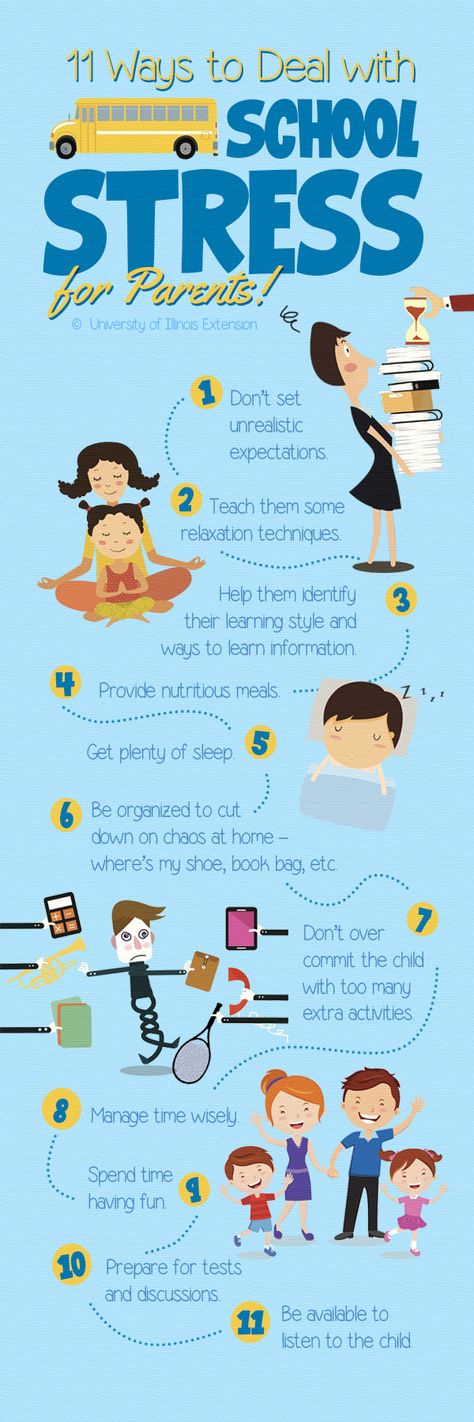 There may be variations in treatment that your pediatrician may recommend based on individual facts and circumstances.
There may be variations in treatment that your pediatrician may recommend based on individual facts and circumstances.
Junior schoolchildren
Stress is a natural and normal part of children's lives and is a constant companion of growing up. Children begin to experience stress at a very early age, and they are more vulnerable to psychological pressure than adults, because they do not yet have effective ways to deal with stress. Therefore, parents need to help ensure that children acquire the appropriate skills, which are extremely important not only in childhood, but also in adulthood.
So what is stress – a disease or a problem?
Stress is like a parasite that devours our strength and resources for further development. Its negative component is so great that it is not limited to only psychological problems, but confidently turns into physical ailment and even chronic diseases.
But there is also an unpleasant moral side to all this - very often it is loving parents who surround their children with an atmosphere of fear, instability and, as a result, stress.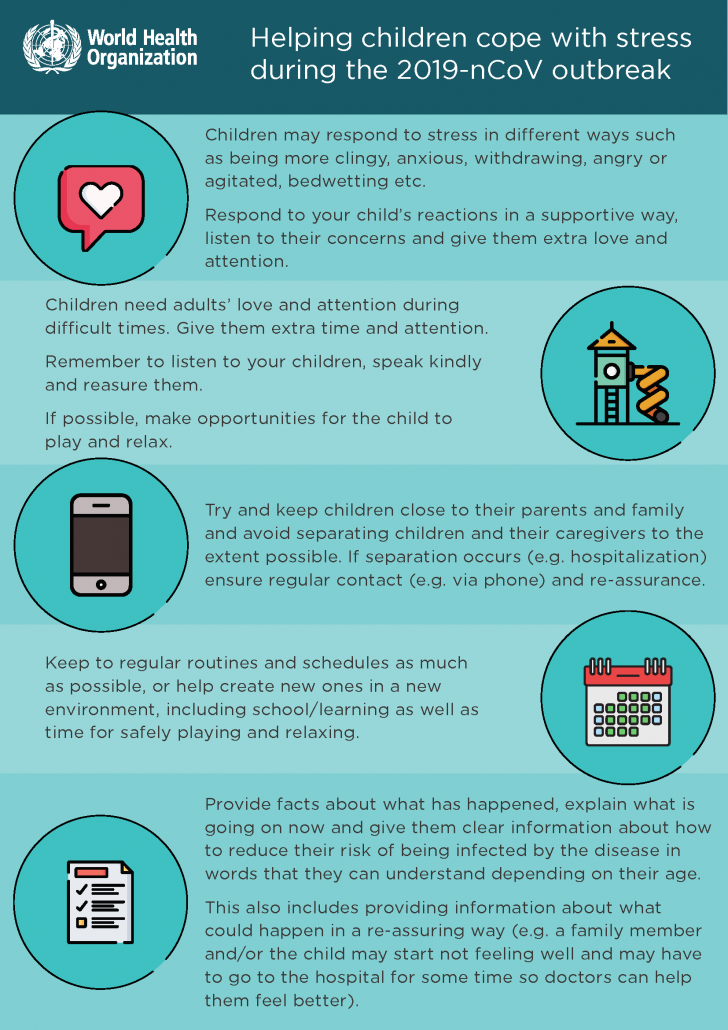
We are often not ready to admit to ourselves that we cannot accept our children as they are. After all, even if a child in the external society has reasons for stress, it is the family that should serve for him as a kind of antidepressant, but this is possible only with the full acceptance of your child, with endless love for him, the real one.
Unfortunately, few of us are capable of such a "feat". Unconsciously, we endlessly try to remake a small personality for a more comfortable coexistence. We equalize opportunities, equalize characters, equalize aspirations.
We often do not perceive a certain talent in a child, and we strive to extinguish it by reviving new hobbies, new goals. This inability to be oneself inevitably leads to inner loneliness, to a forced existence one on one with one's failures, to deep sadness and disappointment.
5 Ways to Help Your Child Manage Stress
1. Take Children's Experiences Seriously
Children have their own stresses. They, of course, are not the same as in adults, but they are quite real. And they should not be underestimated. Often, at psychologists’ appointments, adults admit that when they were little, they were afraid to tell their parents about their worries, because, having done this once, they heard in response: “You are a child! You can't have any problems! I live under stress." After that, the child stopped telling his mother about his experiences. He withdrew, feeling more and more alone.
They, of course, are not the same as in adults, but they are quite real. And they should not be underestimated. Often, at psychologists’ appointments, adults admit that when they were little, they were afraid to tell their parents about their worries, because, having done this once, they heard in response: “You are a child! You can't have any problems! I live under stress." After that, the child stopped telling his mother about his experiences. He withdrew, feeling more and more alone.
What to do: Take time to listen to your child. If he's upset and you can't talk right now, then calm him down and explain that you can't listen to him now, but be sure to sit down with him and discuss his problem later. And don't forget to keep your promise.
2. Each child is different
If you have two or more children of the same age, and even the same sex, then you can easily assume that they have similar tastes in clothes and preferences. This often happens. But sometimes children in the same family, of the same sex, close in age, are very different.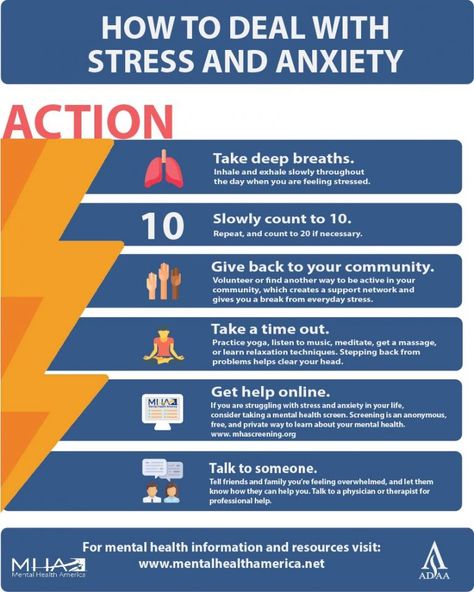 And being the second, third or fourth child, they feel offended if they are not perceived as individuals. An adult woman at a psychologist's appointment said that at the age of 5 she was forced to go to ballet and tap dancing lessons, although she did not know how to dance and did not like it. She liked books and animals, but her parents overlooked her hobbies, focusing on the passions of her older sister.
And being the second, third or fourth child, they feel offended if they are not perceived as individuals. An adult woman at a psychologist's appointment said that at the age of 5 she was forced to go to ballet and tap dancing lessons, although she did not know how to dance and did not like it. She liked books and animals, but her parents overlooked her hobbies, focusing on the passions of her older sister.
What to do: Encourage your children's different hobbies and listen to their needs.
3. Don't take it out on your child when you're stressed
You can experience very strong tension, as well as many people around. Maybe you hate your job, you're locked in a failed marriage, you worry about your parents' health, you worry about paying your bills - those are all your stresses. But you'll be a healthier and happier family if you don't give in to the impulse to raise your voice at your children. Stress makes us irritable. And we can explode at any moment, as a rule, on those people who are next to us.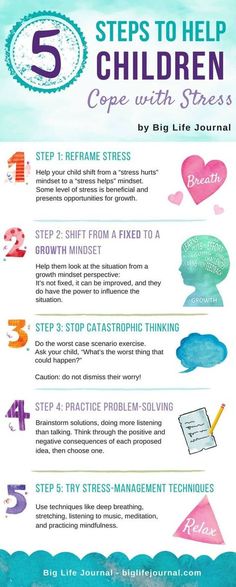 Often adults do not understand how close to the heart a child can take what was said in the heat of the moment.
Often adults do not understand how close to the heart a child can take what was said in the heat of the moment.
What to do: Of course, it is important to focus on your feelings. But if you are stressed, then try to deal with your irritation away from children.
4. Encourage friendship
Making friends is very personal. And that's one of the first things kids do for themselves. Unfortunately, parents do not always like their children's friends, the people they surround themselves with.
What to do: It's important not to criticize your child's friends. Obviously, you are entitled to your opinion and perhaps in time you will be able to explain this to your child. But the first attempts of children to form their own social circle are an integral part of their development. Even when they are small, their choice should be respected.
Help the kids make friends. Not everyone has the courage to strike up a conversation with other children. For many, this is a major stress. Most often, those children in whose families fathers and mothers also have few friends cannot find friends. By the way, people who form a strong social network outside of their family tend to be healthier and happier. So encourage your child to make friends. A party or picnic for your class organized by you will help get the ball rolling if your child is not social.
Most often, those children in whose families fathers and mothers also have few friends cannot find friends. By the way, people who form a strong social network outside of their family tend to be healthier and happier. So encourage your child to make friends. A party or picnic for your class organized by you will help get the ball rolling if your child is not social.
5. Reach out even if you feel like shrugging it off
When children are small, their school days stretch before them forever. In fact, the school occupies all their thoughts and experiences. Psychologists note that for many adults, insecurity began to form precisely when a teacher or parent considered them stupid. Therefore, validate your child's abilities as often as possible. Thus, you will reduce stress and increase his self-esteem.
What to do: Set aside time during the week to discuss with your child what happened at school, what you liked and what was difficult. If there are problems with reading or math, talk about it and help him at home.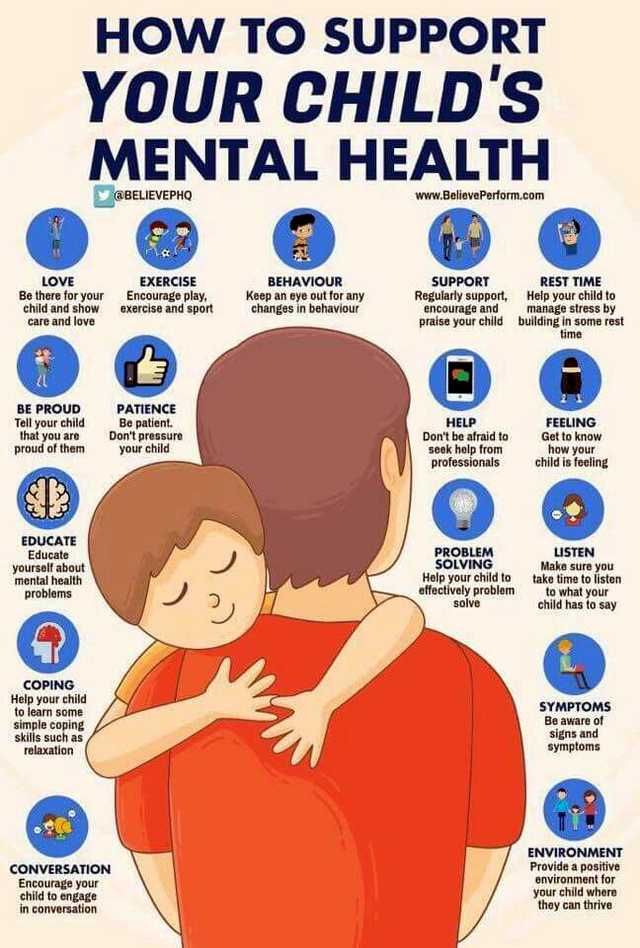 Or negotiate with the teacher for additional help and support.
Or negotiate with the teacher for additional help and support.
How can I help my child deal with stress?
1. Remember that the child has not yet developed ways of coping with stress. He copes with difficulties in the way he can, and not in the right way. Your reaction largely determines how the child will react to the event.
2. Strong feelings in a stressful situation are normal. At the same time, not all children violently show their feelings. The absence of vivid emotional manifestations in the child's behavior does not mean that they do not exist.
3. Try to separate your own feelings about what happened and about the child from the child's emotions. Each of you experiences what happened in your own way
.
4. Be attentive to the child's story about his feelings. Discuss with him his experiences, together look for names for his emotions, explore ways to express them.
5. Share your experiences with your child in a language they can understand.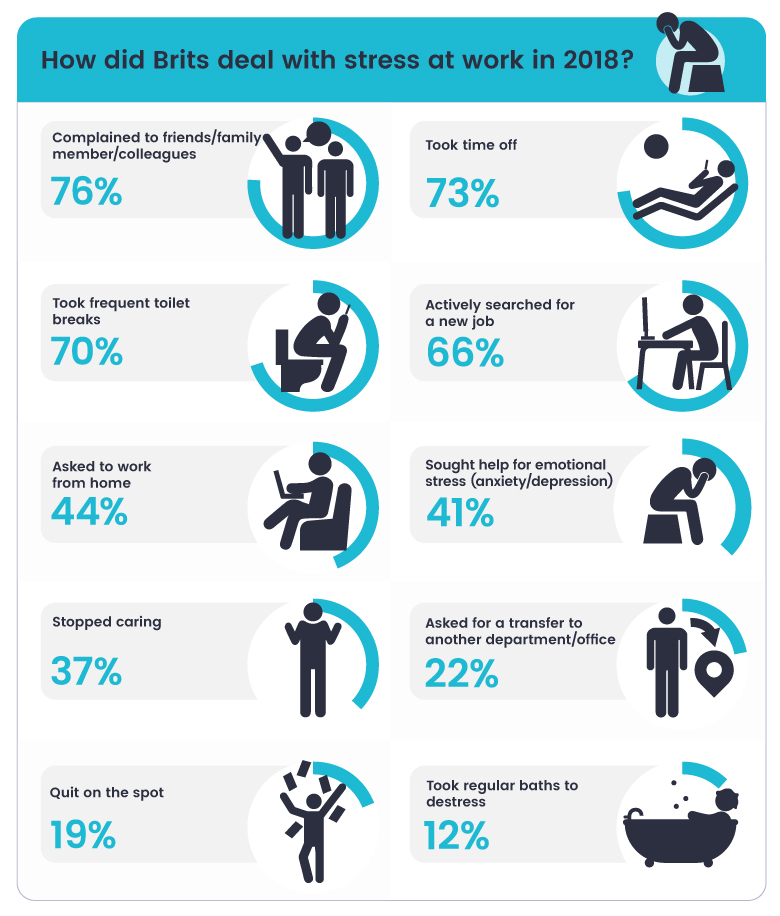
6. Tell your child about your love and care more often.
7. Tactile contact with parents is very important for a child, so hug him more often.
8. Limit your child's contact with the media because the information may be harmful to the child.
9. Be patient if a child repeats a game or story over and over. This may be tiring for you, but in this way he will respond to painful experiences for him. If the child "gets stuck" and the repetitions remain unchanged for several weeks, contact a psychologist.
10. Children are especially sensitive after a traumatic event. They may overreact to sounds, smells, places that remind them of the event. Be aware that these factors can cause strong emotional reactions long after the traumatic event.
11. Spend more time doing things together: play, draw, craft, walk. Encourage games with sand, water, snowballs. Getting to bed can be a very important moment. Use it to be with your child, read a fairy tale to him, etc.
12. Inclusion in joint activities is an important key to understanding what is happening to the child and what he needs. Remember that it is not so much the quantity that matters, but the quality of spending time together.
13. Keep a regular schedule for eating, playing, and sleeping, especially for younger children. This will help the child regain a sense of stability and security.
14. Take care to interact with the child while in a relatively calm, balanced state. Create opportunities for yourself to express strong feelings and talk about what causes them with adults (friends, colleagues, psychologist) who are able to accept them.
15. Maintain relationships with significant people for the child - caregiver, teacher, social worker, psychologist - find out how the child behaves in a different environment.
16. Refrain from telling other people in front of the child about what happened, especially from presenting him as a victim.
17. Under the influence of severe stress, the child's psyche begins to function, as if he "rolled back" to the previous age period.